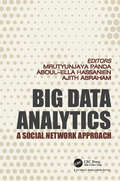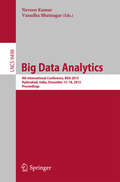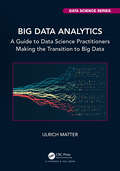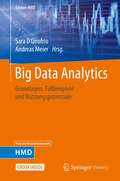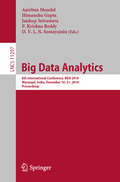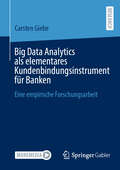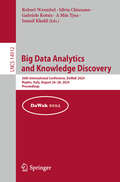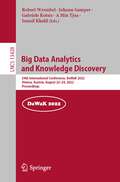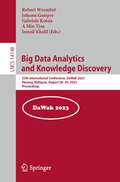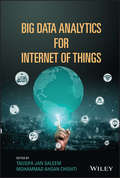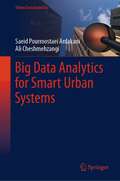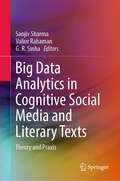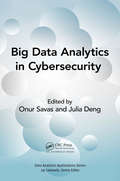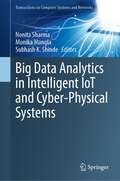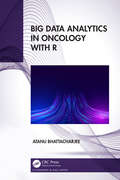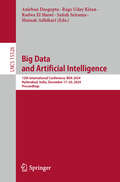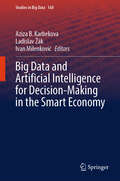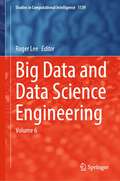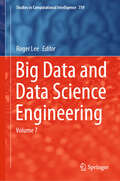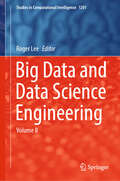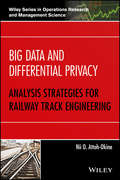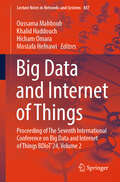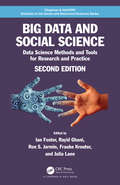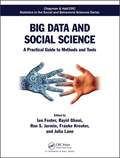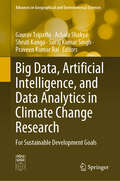- Table View
- List View
Big Data Analytics: A Social Network Approach (Studies in Big Data #30)
by Aboul Hassanien Mrutyunjaya Panda Ajith AbrahamSocial networking has increased drastically in recent years, resulting in an increased amount of data being created daily. Furthermore, diversity of issues and complexity of the social networks pose a challenge in social network mining. Traditional algorithm software cannot deal with such complex and vast amounts of data, necessitating the development of novel analytic approaches and tools. This reference work deals with social network aspects ofbig data analytics. It covers theory, practices and challenges in social networking. The book spans numerous disciplines like neural networking, deep learning, artificial intelligence, visualization, e-learning in higher education, e-healthcare, security and intrusion detection.
Big Data Analytics: 4th International Conference, BDA 2015, Hyderabad, India, December 15-18, 2015, Proceedings (Lecture Notes in Computer Science #9498)
by Naveen Kumar Vasudha BhatnagarThis book constitutes the refereedconference proceedings of the Fourth International Conference on Big DataAnalytics, BDA 2015, held in Hyderabad, India, in December 2015. The 9 revised full papers and 9invited papers were carefully reviewed and selected from 61 submissions andcover topics on big data: security and privacy; big data in commerce; big data:models and algorithms; and big data in medicine.
Big Data Analytics: A Guide to Data Science Practitioners Making the Transition to Big Data (Chapman & Hall/CRC Data Science Series)
by Ulrich MatterSuccessfully navigating the data-driven economy presupposes a certain understanding of the technologies and methods to gain insights from Big Data. This book aims to help data science practitioners to successfully manage the transition to Big Data. Building on familiar content from applied econometrics and business analytics, this book introduces the reader to the basic concepts of Big Data Analytics. The focus of the book is on how to productively apply econometric and machine learning techniques with large, complex data sets, as well as on all the steps involved before analysing the data (data storage, data import, data preparation). The book combines conceptual and theoretical material with the practical application of the concepts using R and SQL. The reader will thus acquire the skills to analyse large data sets, both locally and in the cloud. Various code examples and tutorials, focused on empirical economic and business research, illustrate practical techniques to handle and analyse Big Data. Key Features: - Includes many code examples in R and SQL, with R/SQL scripts freely provided online. - Extensive use of real datasets from empirical economic research and business analytics, with data files freely provided online. - Leads students and practitioners to think critically about where the bottlenecks are in practical data analysis tasks with large data sets, and how to address them. The book is a valuable resource for data science practitioners, graduate students and researchers who aim to gain insights from big data in the context of research questions in business, economics, and the social sciences.
Big Data Analytics: Grundlagen, Fallbeispiele und Nutzungspotenziale (Edition HMD)
by Andreas Meier Sara D'OnofrioMit diesem Herausgeberwerk führen die Autoren den Begriff „Big Data Analytics“ ein und geben Fallstudien aus unterschiedlichen Anwendungsgebieten. Unter Big Data Analytics wird das Aufbereiten, Analysieren und Interpretieren von großen, oft heterogenen Datenbeständen verstanden, mit dem Ziel, Muster und Zusammenhänge in den Daten aufzudecken und Entscheidungsgrundlagen für wissenschaftliche, betriebliche oder gesellschaftliche Fragestellungen zu erhalten. Nebst den theoretischen Grundlagen widmet sich das Herausgeberwerk der Vielfalt verschiedener Anwendungsmöglichkeiten. Fallbeispiele geben Einblick in die Anwendung von Big Data Analytics und dessen Nutzenpotenziale. Das Werk richtet sich gleichermaßen an Studierende, Fachleute aller Fachrichtungen als auch an interessierte Anwender. Es hilft den Leserinnen und Leser, die Bedeutungsvielfalt des Begriffs Big Data Analytics zu verstehen und verschiedene Einsatzmöglichkeiten im eigenen Umfeld zu erkennen und zu bewerten.
Big Data Analytics: 6th International Conference, BDA 2018, Warangal, India, December 18–21, 2018, Proceedings (Lecture Notes in Computer Science #11297)
by Anirban Mondal Himanshu Gupta Jaideep Srivastava P. Krishna Reddy D. V. L. N. SomayajuluThis book constitutes the refereed proceedings of the 6th International Conference on Big Data analytics, BDA 2018, held in Warangal, India, in December 2018. The 29 papers presented in this volume were carefully reviewed and selected from 93 submissions. The papers are organized in topical sections named: big data analytics: vision and perspectives; financial data analytics and data streams; web and social media data; big data systems and frameworks; predictive analytics in healthcare and agricultural domains; and machine learning and pattern mining.
Big Data Analytics als elementares Kundenbindungsinstrument für Banken: Eine empirische Forschungsarbeit
by Carsten GiebeDie vorliegenden Untersuchungen schließen nicht nur eine bestehende Lücke in der akademischen Diskussion zu Big Data Analytics im deutschen Bankwesen, sondern tragen auch zu praktischem Wissen aus verschiedenen Blickwinkeln bei. Erstmalig wurde für Banken in Deutschland der Bezug zwischen dem Modell „Grundsätze der Kundenberatung“ im Zusammenhang mit Big Data Analytics aus der Bankkundenperspektive und der Bankberaterperspektive untersucht. Der Hauptbeitrag dieser Forschung und ihre Originalität bilden Ergebnisse, um den Einsatz von Big Data Analytics als elementares Kundenbindungsinstrument für Banken in Deutschland besser zu verstehen und Richtungen aufzuzeigen, diesen zu nutzen bzw. auszubauen.
Big Data Analytics and Knowledge Discovery: 26th International Conference, DaWaK 2024, Naples, Italy, August 26–28, 2024, Proceedings (Lecture Notes in Computer Science #14912)
by Ismail Khalil A Min Tjoa Robert Wrembel Silvia Chiusano Gabriele KotsisThis book constitutes the proceedings of the 26th International Conference on Big Data Analytics and Knowledge Discovery, DaWaK 2024, which too place in Naples, Italy, during August 26-28, 2024. The 16 full and 20 short papers included in this book were carefully reviewed and selected from 83 submissions. They were organized in topical sections as follows: Modeling and design; entity matching and similarity; classification; machine learning methods and applications; time series; data repositories;optimization; and data quality and applications.
Big Data Analytics and Knowledge Discovery: 24th International Conference, DaWaK 2022, Vienna, Austria, August 22–24, 2022, Proceedings (Lecture Notes in Computer Science #13428)
by Robert Wrembel Johann Gamper Gabriele Kotsis A Min Tjoa Ismail KhalilThis volume LNCS 13428 constitutes the papers of the 24 th International Conference on Big Data Analytics and Knowledge Discovery, held in August 2022 in Vienna, Austria. The 12 full papers presented together with 12 short papers in this volume were carefully reviewed and selected from a total of 57 submissions. The papers reflect a wide range of topics in the field of data integration, data warehousing, data analytics, and recently big data analytics, in a broad sense. The main objectives of this event are to explore, disseminate, and exchange knowledge in these fields.
Big Data Analytics and Knowledge Discovery: 25th International Conference, DaWaK 2023, Penang, Malaysia, August 28–30, 2023, Proceedings (Lecture Notes in Computer Science #14148)
by Robert Wrembel Johann Gamper Gabriele Kotsis A Min Tjoa Ismail KhalilThis book constitutes the proceedings of the 25th International Conference on Big Data Analytics and Knowledge Discovery, DaWaK 2023, which took place in Penang, Malaysia, during August 29-30, 2023. The 18 full papers presented together with 19 short papers were carefully reviewed and selected from a total of 83 submissions. They were organized in topical sections as follows: Data quality; advanced analytics and pattern discovery; machine learning; deep learning; and data management.
Big Data Analytics for Internet of Things
by Tausifa Jan Saleem Mohammad Ahsan ChishtiThis book provides a thorough overview of all the aspects of data analytics in IoT systems including need for data analytics, computing platforms, big data analytical tools, data compression and storage, privacy and security etc. It includes discussions of ways to extract valuable insights from Big Data with the help of techniques like Regression, K-Nearest Neighbor, Decision tree, Support Vector Machine, Naïve Bayes, Clustering, Deep Neural Networks etc. The book explains the techniques that are suitable for digging out the best decisions from large amounts of IoT data to gain control of IoT devices. Moreover, the book offers novel designs for IoT systems covering applications like smart homes, smart healthcare, smart transportation, smart manufacturing, smart grid, smart agriculture, smart education, and smart government. The book discusses all aspects of IoT data analytics including presently available strategies as well as loopholes in those strategies and new solutions.
Big Data Analytics for Smart Urban Systems (Urban Sustainability)
by Saeid Pourroostaei Ardakani Ali CheshmehzangiBig Data Analytics for Smart Urban Systems aims to introduce Big data solutions for urban sustainability smart applications, particularly for smart urban systems. It focuses on intelligent big data which takes the benefits of machine learning to analyse large and rapidly changing datasets in smart urban systems. The state-of-the-art Big data analytics applications are presented and discussed to highlight the feasibility of big data and machine learning solutions to enhance smart urban systems, smart operations, urban management, and urban governance. The key benefits of this book are, (1) to introduce the principles of machine learning-enabled big data analysis in smart urban systems, (2) to present the state-of-the-art data analysis solutions in smart management and operations, and (3) to understand the principles of big data analytics for smart cities and communities. Endorsements‘Over the many years of collaboration between academia and industry, we noticed the common language is ‘big data’; with that, we have developed novel ideas to bridge the gaps and help promote innovation, technologies, and science’.- Tian Tang, Independent Researcher, China ‘Big Data Analytics is a fascinating research area, particularly for cities and city transformations. This book is valuable to those who think vigorously and aim to act ahead’.- Li Xie, Independent Researcher, China‘For urban critiques, knowledge trains aspiring opportunities toward outstanding manifestations. Smartness has evolved or/ advanced rambunctious & embracing realities along (with) novel directions and nurturing integrated city knowledge’.- Aaron Golden, SELECT Consultants, UK
Big Data Analytics in Cognitive Social Media and Literary Texts: Theory and Praxis
by Sanjiv Sharma Valiur Rahaman G. R. SinhaThis book provides a comprehensive overview of the theory and praxis of Big Data Analytics and how these are used to extract cognition-related information from social media and literary texts. It presents analytics that transcends the borders of discipline-specific academic research and focuses on knowledge extraction, prediction, and decision-making in the context of individual, social, and national development. The content is divided into three main sections: the first of which discusses various approaches associated with Big Data Analytics, while the second addresses the security and privacy of big data in social media, and the last focuses on the literary text as the literary data in Big Data Analytics. Sharing valuable insights into the etiology behind human cognition and its reflection in social media and literary texts, the book benefits all those interested in analytics that can be applied to literature, history, philosophy, linguistics, literary theory, media & communication studies and computational/digital humanities.
Big Data Analytics in Cybersecurity (Data Analytics Applications)
by Onur Savas Julia DengBig data is presenting challenges to cybersecurity. For an example, the Internet of Things (IoT) will reportedly soon generate a staggering 400 zettabytes (ZB) of data a year. Self-driving cars are predicted to churn out 4000 GB of data per hour of driving. Big data analytics, as an emerging analytical technology, offers the capability to collect, store, process, and visualize these vast amounts of data. Big Data Analytics in Cybersecurity examines security challenges surrounding big data and provides actionable insights that can be used to improve the current practices of network operators and administrators. Applying big data analytics in cybersecurity is critical. By exploiting data from the networks and computers, analysts can discover useful network information from data. Decision makers can make more informative decisions by using this analysis, including what actions need to be performed, and improvement recommendations to policies, guidelines, procedures, tools, and other aspects of the network processes. Bringing together experts from academia, government laboratories, and industry, the book provides insight to both new and more experienced security professionals, as well as data analytics professionals who have varying levels of cybersecurity expertise. It covers a wide range of topics in cybersecurity, which include: Network forensics Threat analysis Vulnerability assessment Visualization Cyber training. In addition, emerging security domains such as the IoT, cloud computing, fog computing, mobile computing, and cyber-social networks are examined. The book first focuses on how big data analytics can be used in different aspects of cybersecurity including network forensics, root-cause analysis, and security training. Next it discusses big data challenges and solutions in such emerging cybersecurity domains as fog computing, IoT, and mobile app security. The book concludes by presenting the tools and datasets for future cybersecurity research.
Big Data Analytics in Intelligent IoT and Cyber-Physical Systems (Transactions on Computer Systems and Networks)
by Nonita Sharma Monika Mangla Subhash K. ShindeThis book explores the complete system perspective, underlying theories, modeling, and applications of cyber-physical systems (CPS). Considering the interest of researchers and academicians, the editors present this book in a multidimensional perspective covering CPS at breadth. It covers topics ranging from discussion of rudiments of the system and efficient management to recent research challenges and issues. This book is divided into four sections discussing the fundamentals of CPS, engineering-based solutions, its applications, and advanced research challenges. The contents highlight the concept map of CPS including the latest technological interventions, issues, challenges, and the integration of CPS with IoT and big data analytics, modeling solutions, distributed management, efficient energy management, cyber-physical systems research, and education with applications in industrial, agriculture, and medical domains. This book is of immense interest to those in academia and industry.
Big Data Analytics in Oncology with R
by Atanu BhattacharjeeBig Data Analytics in Oncology with R serves the analytical approaches for big data analysis. There is huge progressed in advanced computation with R. But there are several technical challenges faced to work with big data. These challenges are with computational aspect and work with fastest way to get computational results. Clinical decision through genomic information and survival outcomes are now unavoidable in cutting-edge oncology research. This book is intended to provide a comprehensive text to work with some recent development in the area. Features: Covers gene expression data analysis using R and survival analysis using R Includes bayesian in survival-gene expression analysis Discusses competing-gene expression analysis using R Covers Bayesian on survival with omics data This book is aimed primarily at graduates and researchers studying survival analysis or statistical methods in genetics.
Big Data and Artificial Intelligence: 12th International Conference, BDA 2024, Hyderabad, India, December 17–20, 2024, Proceedings (Lecture Notes in Computer Science #15526)
by Anirban Dasgupta Rage Uday Kiran Radwa El Shawi Satish Srirama Mainak AdhikariThis book constitutes the proceedings of the 12th International Conference on Big Data and Artificial Intelligence, BDA 2024, held in Hyderabad, India, during December 17–20, 2024. The 16 full papers and 12 short papers presented here were carefully reviewed and selected from 106 submissions. These papers have been categorized under the following topical sections: Image Classification; Graph Analytics; Big Data Analytics; Applications; Data Science; Health-Care Analytics; eLearning; Prediction and Forecasting.
Big Data and Artificial Intelligence for Decision-Making in the Smart Economy (Studies in Big Data #168)
by Aziza B. Karbekova Ladislav Žák Ivan MilenkovićThis book focuses on the systemic scientific-methodological and practical exploration of organizational-technical and socio-economic issues related to the automation of decision-making in the smart economy under Industry 4.0 using big data and artificial intelligence (AI). The scientific novelty of the results presented in the book lies in uncovering the “black box” of decision-making automation in the smart economy through these technologies. The book clarifies the role and significance of big data and AI in decision-making within the smart economy, highlighting its fundamental importance. Additionally, the book thoroughly discusses international experiences in decision-making automation in the smart economy, with examples from Armenia, Kyrgyzstan, and other Central Asian countries, demonstrating its empirical value. The book reveals advanced organizational-economic models for decision-making based on big data and AI. It also presents the latest trends in the development of the smart economy using big data and AI. Moreover, the book explains the socio-ecological and legal aspects of the ethics in applying big data and AI technologies. Additionally, the book proposes prospective applied solutions for decision-making in the smart economy based on big data and AI. The target audience of the book includes scientists studying big data and AI.
Big Data and Data Science Engineering: Volume 6 (Studies in Computational Intelligence #1139)
by Roger LeeThe book reports state-of-the-art results in Big Data and Data Science Engineering in both printed and electronic form. Studies in Computation Intelligence (SCI) has grown into the most comprehensive computational intelligence research forum available in the world. This book publishes original papers on both theory and practice that address foundations, state-of-the-art problems and solutions, and crucial challenges.
Big Data and Data Science Engineering: Volume 7 (Studies in Computational Intelligence #759)
by Roger LeeThis book reports state-of-the-art results in Big Data and Data Science Engineering in both printed and electronic form. Studies in Computation Intelligence (SCI) has grown into the most comprehensive computational intelligence research forum available in the world. This book publishes original papers on both theory and practice that address foundations, state-of-the-art problems and solutions, and crucial challenges.
Big Data and Data Science Engineering: Volume 8 (Studies in Computational Intelligence #1201)
by Roger LeeThis book reports state-of-the-art results in big data and data science engineering in both printed and electronic forms. Studies in computation intelligence (SCI) has grown into the most comprehensive computational intelligence research forum available in the world. This book publishes original papers on both theory and practice that address foundations, state-of-the-art problems and solutions, and crucial challenges.
Big Data and Differential Privacy: Analysis Strategies for Railway Track Engineering
by Nii O. Attoh-OkineA comprehensive introduction to the theory and practice of contemporary data science analysis for railway track engineering Featuring a practical introduction to state-of-the-art data analysis for railway track engineering, Big Data and Differential Privacy: Analysis Strategies for Railway Track Engineering addresses common issues with the implementation of big data applications while exploring the limitations, advantages, and disadvantages of more conventional methods. In addition, the book provides a unifying approach to analyzing large volumes of data in railway track engineering using an array of proven methods and software technologies. Dr. Attoh-Okine considers some of today’s most notable applications and implementations and highlights when a particular method or algorithm is most appropriate. Throughout, the book presents numerous real-world examples to illustrate the latest railway engineering big data applications of predictive analytics, such as the Union Pacific Railroad’s use of big data to reduce train derailments, increase the velocity of shipments, and reduce emissions. In addition to providing an overview of the latest software tools used to analyze the large amount of data obtained by railways, Big Data and Differential Privacy: Analysis Strategies for Railway Track Engineering: • Features a unified framework for handling large volumes of data in railway track engineering using predictive analytics, machine learning, and data mining • Explores issues of big data and differential privacy and discusses the various advantages and disadvantages of more conventional data analysis techniques • Implements big data applications while addressing common issues in railway track maintenance • Explores the advantages and pitfalls of data analysis software such as R and Spark, as well as the Apache™ Hadoop® data collection database and its popular implementation MapReduce Big Data and Differential Privacy is a valuable resource for researchers and professionals in transportation science, railway track engineering, design engineering, operations research, and railway planning and management. The book is also appropriate for graduate courses on data analysis and data mining, transportation science, operations research, and infrastructure management. NII ATTOH-OKINE, PhD, PE is Professor in the Department of Civil and Environmental Engineering at the University of Delaware. The author of over 70 journal articles, his main areas of research include big data and data science; computational intelligence; graphical models and belief functions; civil infrastructure systems; image and signal processing; resilience engineering; and railway track analysis. Dr. Attoh-Okine has edited five books in the areas of computational intelligence, infrastructure systems and has served as an Associate Editor of various ASCE and IEEE journals.
Big Data and Internet of Things: Proceeding of The Seventh International Conference on Big Data and Internet of Things BDIoT'24, Volume 2 (Lecture Notes in Networks and Systems #887)
by Oussama Mahboub Khalid Haddouch Hicham Omara Mostafa Hefnawi"Big Data and Internet of Things" is the latest volume in the renowned Lecture Notes in Networks and Systems series. This book compiles the latest research presented at the Seventh International Conference on Big Data and Internet of Things (BDIoT'24), showcasing innovative solutions, emerging trends, and practical applications in the fields of big data and IoT. An essential read for researchers, professionals, and students looking to stay ahead in the rapidly evolving world of technology. The series contains proceedings and edited volumes in systems and networks, spanning the areas of Cyber-Physical Systems, Autonomous Systems, Sensor Networks, Control Systems, Energy Systems, Automotive Systems. Biological Systems, Vehicular Networking and Connected Vehicles, Aerospace Systems Automation, Manufacturing, Smart Grids. Nonlinear Systems, Power Systems, Robotics, Social Systems, Economic Systems and other. The series covers the theory, applications, and perspectives on the state of the art and future developments relevant to systems and networks, decision making, control, complex processes and related areas, as embedded in the fields of interdisciplinary and applied sciences, engineering, computer science, physics, economics, social, and life sciences, as well as the paradigms and methodologies behind them.
Big Data and Social Science: Data Science Methods and Tools for Research and Practice (Chapman & Hall/CRC Statistics in the Social and Behavioral Sciences)
by Ian Foster, Rayid Ghani, Ron S. Jarmin, Frauke Kreuter and Julia LaneBig Data and Social Science: Data Science Methods and Tools for Research and Practice, Second Edition shows how to apply data science to real-world problems, covering all stages of a data-intensive social science or policy project. Prominent leaders in the social sciences, statistics, and computer science as well as the field of data science provide a unique perspective on how to apply modern social science research principles and current analytical and computational tools. The text teaches you how to identify and collect appropriate data, apply data science methods and tools to the data, and recognize and respond to data errors, biases, and limitations. Features: Takes an accessible, hands-on approach to handling new types of data in the social sciences Presents the key data science tools in a non-intimidating way to both social and data scientists while keeping the focus on research questions and purposes Illustrates social science and data science principles through real-world problems Links computer science concepts to practical social science research Promotes good scientific practice Provides freely available workbooks with data, code, and practical programming exercises, through Binder and GitHub New to the Second Edition: Increased use of examples from different areas of social sciences New chapter on dealing with Bias and Fairness in Machine Learning models Expanded chapters focusing on Machine Learning and Text Analysis Revamped hands-on Jupyter notebooks to reinforce concepts covered in each chapter This classroom-tested book fills a major gap in graduate- and professional-level data science and social science education. It can be used to train a new generation of social data scientists to tackle real-world problems and improve the skills and competencies of applied social scientists and public policy practitioners. It empowers you to use the massive and rapidly growing amounts of available data to interpret economic and social activities in a scientific and rigorous manner.
Big Data and Social Science: A Practical Guide to Methods and Tools
by Julia Lane Frauke Kreuter Ian Foster Rayid Ghani Ron S. JarminBig Data and Social Science: A Practical Guide to Methods and Tools shows how to apply data science to real-world problems in both research and the practice. The book provides practical guidance on combining methods and tools from computer science, statistics, and social science. This concrete approach is illustrated throughout using an important national problem, the quantitative study of innovation. The text draws on the expertise of prominent leaders in statistics, the social sciences, data science, and computer science to teach students how to use modern social science research principles as well as the best analytical and computational tools. It uses a real-world challenge to introduce how these tools are used to identify and capture appropriate data, apply data science models and tools to that data, and recognize and respond to data errors and limitations.
Big Data, Artificial Intelligence, and Data Analytics in Climate Change Research: For Sustainable Development Goals (Advances in Geographical and Environmental Sciences)
by Praveen Kumar Rai Shruti Kanga Suraj Kumar Singh Gaurav Tripathi Achala ShakyaThis book explores the potential of big data, artificial intelligence (AI), and data analytics to address climate change and achieve the Sustainable Development Goals (SDGs). Furthermore, the book covers a wide range of related topics, including climate change data sources, big data analytics techniques, remote sensing, renewable energy, open data, public–private partnerships, ethical and legal issues, and case studies of successful applications. The book also discusses the challenges and opportunities presented by these technologies and provides insights into future research directions.In order to address climate change and achieve the SDGs, it is crucial to understand the complex interplay between climate and environmental factors. The use of big data, AI, and data analytics can play a vital role in this effort by providing the means to collect, process, and analyze vast amounts of environmental data. This book is an essential resource for researchers, policymakers, and practitioners interested in leveraging these technologies to tackle the pressing challenge of climate change and achieve the SDGs.
